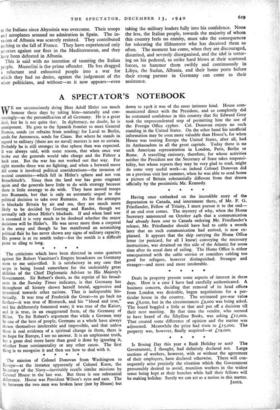The mission of Colonel Donovan from Washington to Europe—at the
instance apparently of Colonel Knox, the Secretary of the Navy—inevitably recalls similar missions by Colonel House in the last war. But there is one substantial difference. House was President Wilson's eyes and ears. The tie between the two men was broken later (not by House) but down to 1918 it was of the most intimate kind. House com- municated direct with the President, and so completely did he command confidence in this country that Sir Edward Grey took the unprecendented step of permitting him the use of the Foreign Office cypher. Col. Donovan enjoys no such standing in the United States. On the other hand his unofficial information may be even more valuable than House's, for when House was touring Europe the United States, after all, had its Ambassadors in all the great capitals. Today there is no such American representation in London, Paris, Berlin or Rome. A travelling emissary, therefore, for whose activities neither the President nor the Secretary of State takes responsi- bility, but whose reports they may be very glad to read, might do some very useful work—as indeed Colonel Donovan did on a previous visit last summer, when he was able to send home a picture of Britain substantially different from that drawn officially by the pessimistic Mr. Kennedy.










































 Previous page
Previous page